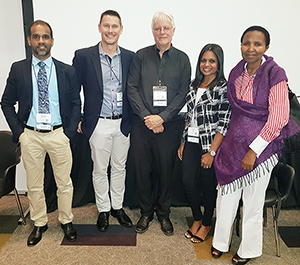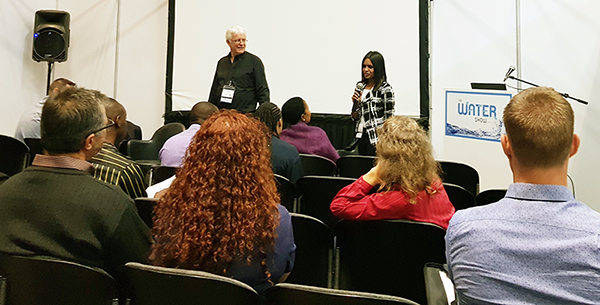

Bashan Govender (Chief Directorate, Mine Water Management: National Department of Water and Sanitation), Richard Garner (Head: Department of Environmental Sciences, The MSA Group), Richard Holden (Strategic Business Analyst, TCTA), Suvania Naidoo (Lecturer: Development Studies, Unisa) and Sophia Tlale (Environmental Manager: TCTA)
Water Show Africa took place from 26 to 27 March 2019 at the Sandton Convention Centre. With more than 3 000 attendees, it is recognised as Africa's leading conference and exhibition for water professionals. It is aimed at displaying the latest services and innovations to improve the delivery of water infrastructure and efficiency in service supply.
Water security is currently one of the most topical issues, because of the increasing demand for the resource. Exploring solutions to increase and sustain our access to clean water is on the agenda throughout the African continent. Water Show Africa hosted a range of CEOs, government officials, senior executives and engineers, all of whom contributed innovative ideas for water projects.
Unisa’s Suvania Naidoo, lecturer in the Department of Development Studies, was invited to speak at the event because of her research on the socio-economic impacts of acid mine drainage (AMD). This research earned her the Principal’s Prize for Excellence in Research, which she received on 8 March 2019. She is currently working on the various and conflicting perceptions of stakeholders on the water quality of the Blesbokspruit wetland and has done extensive research on the Eastern Basin AMD treatment plant, situated in Springs, Gauteng.
She formed part of a group that included experts Bashan Govender, Deputy Director of Mine Water Management, National Department of Water and Sanitation; Richard Holden, Business Analyst, Trans Caledon Tunnel Authority (TCTA); Sophia Tlale, Environmental Manager, TCTA; and Richard Garner, Head of Environmental Sciences, the MSA group. They presented a Water in Mining workshop entitled "All you ever wanted to know about AMD but were too afraid to ask".
AMD caused by abandoned mines became highly publicised in 2011/12 as a result of its increasing impact on the environment. With water being such a scarce resource, the major concern was that untreated AMD would decant into the environment and would ultimately create catastrophic impacts on the Vaal River System. This critical concern led to emergency measures being put in place by the National Department of Water and Sanitation (DWS).
Together with TCTA (a state-owned entity that implements bulk raw water infrastructure projects), they implemented emergency short-term treatment projects in the three basins of the Witwatersrand to control AMD from causing excessive environmental damage. This was done by partially treating AMD in each basin and pumping the neutralised water (a result of the short-term treatment) into the nearest watercourse. AMD was therefore very negatively publicised before the short-term treatment process began. The public are still fearful of the potential social and environmental impacts. Because of the urgency to implement the short-term treatment, this led to a lack of communication, which inevitably created confusion and misunderstanding between stakeholders about the short-term treatment process.
This workshop aimed at raising awareness on this environmental issue caused by past mining activity, creating intense conflict and debate over the last couple of years. The workshop was interactive, and stimulated debate and comprehensive discussions that informed delegates on the implementation strategy and the emergency measures that were put in place by the DWS to prevent the decanting of untreated AMD into the environment.

Suvania Naidoo (Lecturer: Development Studies, Unisa) spoke at Water Show Africa about AMD from a social science perspective.
Various stakeholders (including community members, environmental activists, agricultural sector and mining industry, to name a few) have already gained mixed and conflicting perceptions on the treatment process and even though AMD is controlled in the three basins, various stakeholders are still concerned about the actual treatment process and the impact of discharging neutralised water into rivers. The biggest concern is on how long this process will occur until the long-term treatment of desalination begins.
The presenters aimed to clarify and inform, by looking specifically at the Blesbokspruit catchment (Eastern Basin), and identifying broader existing issues, which also influence the water quality in this basin, besides that of AMD and its treatment. Other sources of pollution include failing wastewater treatment works, the agricultural sector and the coal-mining sector. Various stakeholders interact with the Blesbokspruit for different water uses. The diversity of stakeholders and users of the water in this catchment makes it complicated to measure what the exact source of pollution is. Other topics discussed included the management of tailings (used to store by-products of mining operations), looking at the past, present and future of tailings, and how pollution can be reduced.
Naidoo spoke about AMD from a social science perspective, taking into account the human element. Considering the immense pressure placed on the government to address the AMD issue, she discussed why conflicting perceptions of the water quality of the Blesbokspruit exist. If the perceptions of water quality are not attributed solely to the treatment of AMD, what then are the reasons for people’s mixed or conflicting perceptions? Her main contribution showed that vested interests exist depending on the group of stakeholders, their professional stance and use for water. She also discussed issues relating to the public participation process, the environmental impact assessment process and the concerns that key stakeholders have raised with regard to the treatment of AMD.
The workshop was thought-provoking and informative, and many concerns were addressed.
* Submitted by the Department of Development Studies, College of Human Sciences
Publish date: 2019/04/02